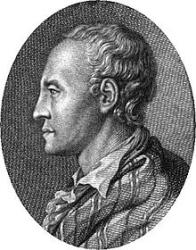- |
User Links
L. H. C. Hölty

www.wikipedia.org
| Short Name: | L. H. C. Hölty |
| Full Name: | Hölty, Ludwig Heinrich Christoph, 1748-1776 |
| Birth Year: | 1748 |
| Death Year: | 1776 |
Hölty, Ludwig Heinrich Christoph, son of P. E. Hölty, pastor at Mariensee on the Lcine, nenr Hannover, was born at Mariensee, Dec. 21, 1748. He entered the University of Gottingen, 1769; completed his course, Easter, 1772; and became a Candidate of Theology, but never obtained a charge. He died at Han¬nover, Sept. 1, 1776. His complete Gedichte, edited by his friend J. H. Voss, were published at Hamburg, 1783 (2nd ed. 1804). The only piece which can be called a hymn and has been translated into English is:—
Ueb' immer Treu und Redlichkeit. Conduct of Life. First published in J. H. Voss's Musenalmanach, Hamburg, 1119, p. ill, in 9 stanzas of 4 lines, entitled "The old country¬man to his son." Included in the Oldenburg Gesang-Buch, 1791, No. 480. The translation are, (1) "Let truth and spotless faith be thine," in the Harp of Zion, ed. by Basil Woodd, 1833, &, 101; (2) “With honest heart go on your way," in Dawson's Psalms & Hymns 1846, No. 112. [Rev. James Mearns, M.A.]
--John Julian, Dictionary of Hymnology (1907)
=====================
Hölty, Ludwig H. C, p. 530, i. Concerning the translation of his hymn "Ueb' immer Treu," we note that No. 1 is found in the German Songster, Berlin, 1798, p. 13; No. 2 is by Joseph Gostick, in his Spirit of German Poetry, 1845, p. 139.
--John Julian, Dictionary of Hymnology, Appendix, Part II (1907)
| Texts by L. H. C. Hölty (3) | As | Authority Languages | Instances |
|---|---|---|---|
| Der Schnee zerrinnt, der Mai beginnt | L. H. Chr. Hölty, 1748-1776 (Author) | German | 3 |
| Die Luft ist blau, das Tal ist grün | L. H. Chr. Hölty (Author) | German | 2 |
| Üb immer Treu' und Redlichkeit | L. H. Hölty (Author) | German | 10 |


 My Starred Hymns
My Starred Hymns


